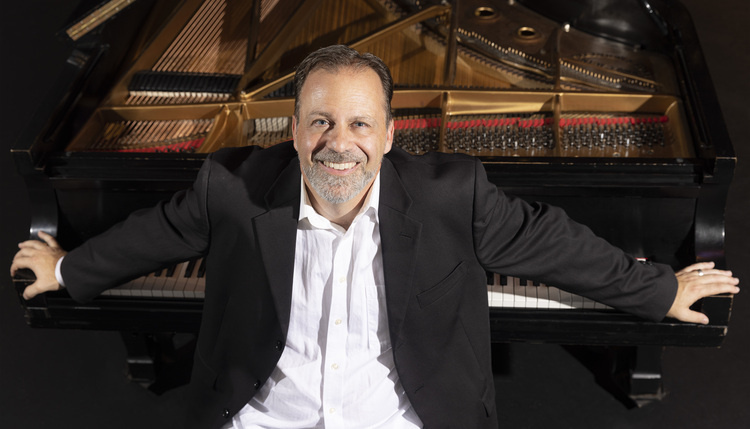Professional trombonist, URI professor take the stage
Pictured: David Gilliland, an assistant professor of collaborative piano. PHOTO CREDIT: uri.edu
A number of sophisticated arrangements were showcased during the University of Rhode Island’s musical presentation “Flights of Fancy: Dances for Trombone and Piano.”
The concert was organized by David Gilliland, assistant teaching professor of collaborative piano, and Ilan Morgenstern, a professional bass trombonist whose talents have been noted by the International Trombone Association Journal.
Each arrangement wonderfully displayed the unlikely duo of bass trombone and piano – a companionship that was pleasantly surprising and complimentary.
The set included pieces by Arturo Marquez, Johannes Brahms, Etienne Crausaz and Astro Piazolla, all of which were arranged by Gilliland. Besides these pieces, they played Gilliland’s own compositions.
He said that the choice of music for this particular concert was focused on showcasing “Latin flavors,” a decision which made for an energetic display of the mechanics of both trombone and piano.
On the presentation of Latin pieces, Gillian noted that musicians “need to find new pieces to champion,” a sentiment that brings new vitality and life to the oftentimes worn-out productions of overplayed western classical canon.
One could feel this at the onset of the show, as the two performers began with the upbeat “Danzon No. 2” by Marquez. Morgenstern attacked the piece with a strength that was felt throughout the hall.
As the trombone tracked the Cuban dance, it became obvious how distinct and appropriate the arrangement was for the two instruments: the seamless tone displayed perfectly epitomized the careful scaffolding of warm piano beneath it – a suggestion that was nothing but a compliment to Gilliland’s skillful arrangement.
The two well-established voices were at times soulful and at others precise. This showed a greater quality of what it means to transition through an animated, inflective dance.
The following piece was a selection of Brahms etudes, which were written in a period of the composer’s life that Morgenstern referred to as “innocent.” The two musicians’ interpretation of early Brahms was a wonderful way to repurpose and present the purity of composition.
One could pick out a tongue-in-cheek demonstration of flashiness from each composer, arranger and performer, a feeling which made the pieces come off smart yet quirky, calculated yet loose.
Following the delightful Brahms was Gilliland’s own composition entitled “Three Sketches of COVID-Times.” The opening “Quarantine Drag” was a mournful, slow rag in which the mechanical qualities of the bass trombone perfectly and intelligently reflected the interpretative themes of Gilliland’s composition.
“I targeted distinct feelings that I was experiencing in the middle of the pandemic for the set of the ‘Three Sketches of Covid-Times,’” Gilliland said.
The second piece entitled “Sorrow and Isolation” began with a meditative piano cadenza that felt as though it were gesturing at a harrowing inflection period: an ideal characterization of the senselessness which was brought on by isolation in the COVID-19 pandemic.
The final piece, “DoorDash Mambo,” was a hopeful end to a deep contemplative state. The quippy piece gave the listener insight into the hectic yet hopeful realities of the post-quarantine lifestyle. What was particularly admirable was Gilliand’s will to end his collection on a light and uplifting note, despite the darkness which trailed behind it.
The next piece was Crausaz’s “Eastern Folk Dances,” which was originally composed for accordion and tuba. Gilliand captured the warm, sustained chord qualities of an accordion flawlessly. The trombone playing sought to bounce about just as a tuba is so famously known to do.
It was at this point it became clear that Morgenstern was beyond technically proficient, as his tone – which one must talk about – fit the contemplative nuances of Eastern European tuba composition as if one never knew the music was arranged in the first place.
The collection of dances also showcased a few wonderful cadenzas which left the listener satisfied beyond expectation.
Morgenstern said that because of Gilliland’s skill in arrangement, the two were “equals on stage,” both in and out of solo and rhythmic support.
The final piece of the night, Piazolla’s “Le Grand Tango,” was a repurposing of the tango to take on a grandiose dimension that it had not been granted before. Watching the two performers in their element with a joyous tango was nothing short of bliss. The two played off of one another, developing into soaring, interchanging lines that became the embodiment of the “Flights of Fancy.”
The concert was an absolute pleasure and, should the opportunity arise, the following production of either of the two musicians is a great way to spend an evening.




